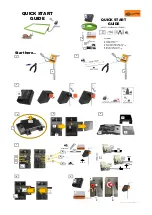
Fault tracing 357
Fault messages generated by the drive
CODE FAULT
CAUSE
WHAT TO DO
0001
OVERCURRENT
(2310)
bit 0
Output current has
exceeded trip level.
Sudden load change or
stall.
Check motor load and mechanics.
Insufficient acceleration
time.
Check acceleration time (
and
). Check the possibility of using
vector control.
Incorrect motor data.
Check that motor data (Group 99) is
equal to motor rating plate values. If
using vector control, perform ID run
Motor and/or drive is too
small for the application.
Check sizing.
Damaged motor cables,
damaged motor or wrong
motor connection
(star/delta).
Check motor, motor cable and
connections (including phasing).
Internal fault of the drive.
Drive gives an
overcurrent fault after
start command even
when the motor is not
connected (use scalar
control in this trial).
Replace the drive.
High frequency noise in
STO lines.
Check the STO cabling and remove
the noise sources nearby.
0002
DC OVERVOLT
(3210)
bit 1
Excessive intermediate
circuit DC voltage. DC
overvoltage trip limit is
420 V for 200 V drives
and 840 V for 400 V
drives.
Supply voltage is too
high or noisy. Static or
transient overvoltage in
the input power supply.
Check input voltage level and check
power line for static or transient
overvoltage
If the drive is used in a
floating network, DC
overvoltage fault may
appear
In a floating network, remove the EMC
screw from the drive.
Summary of Contents for ACS355 series
Page 1: ...ABB machinery drives User s manual ACS355 drives ...
Page 4: ......
Page 16: ...16 ...
Page 32: ...32 Operation principle and hardware description ...
Page 58: ...58 Electrical installation ...
Page 74: ...74 Start up control with I O and ID run ...
Page 106: ...106 Control panels ...
Page 120: ...120 Application macros ...
Page 178: ...178 Program features ...
Page 338: ...338 Fieldbus control with embedded fieldbus ...
Page 368: ...368 Fault tracing ...
Page 404: ...404 Dimension drawings ...
Page 410: ...410 Appendix Resistor braking ...
Page 434: ...434 Appendix Permanent magnet synchronous motors PMSMs ...
















































